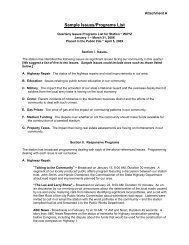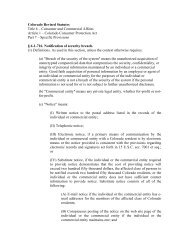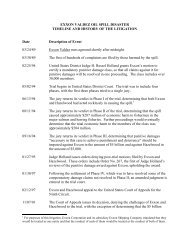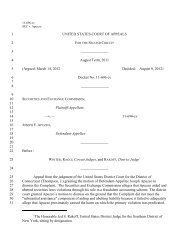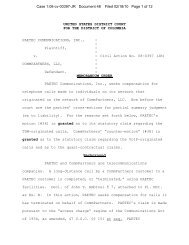QUANTA SERVICES INC, QUANTA SERVICES MANAGEMENT ...
QUANTA SERVICES INC, QUANTA SERVICES MANAGEMENT ...
QUANTA SERVICES INC, QUANTA SERVICES MANAGEMENT ...
Create successful ePaper yourself
Turn your PDF publications into a flip-book with our unique Google optimized e-Paper software.
In addition, our customers may cancel, delay or reduce the number or size of projects available to us for a<br />
variety of reasons, including capital constraints or inability to the meet regulatory requirements. Many of the<br />
factors affecting our ability to generate internal growth may be beyond our control, and we cannot be certain that<br />
our strategies for achieving internal growth will be successful.<br />
Our business is highly competitive.<br />
The specialty contracting business is served by numerous small, owner-operated private companies, some<br />
public companies and several large regional companies. In addition, relatively few barriers prevent entry into<br />
some areas of our business. As a result, any organization that has adequate financial resources and access to<br />
technical expertise may become one of our competitors. Competition in the industry depends on a number of<br />
factors, including price. For example, we are currently experiencing the impacts of competitive pricing in certain<br />
of the markets we serve, such as the electric power market with respect to smaller scale transmission projects and<br />
distribution services. Certain of our competitors may have lower overhead cost structures and, therefore, may be<br />
able to provide their services at lower rates than we are able to provide. In addition, some of our competitors<br />
have significant resources, including financial, technical and marketing resources. We cannot be certain that our<br />
competitors do not have or will not develop the expertise, experience and resources to provide services that are<br />
superior in both price and quality to our services. Similarly, we cannot be certain that we will be able to maintain<br />
or enhance our competitive position within the specialty contracting business or maintain our customer base at<br />
current levels. We also face competition from the in-house service organizations of our existing or prospective<br />
customers. Electric power, natural gas, oil and telecommunications service providers usually employ personnel<br />
who perform some of the same types of services we do, and we cannot be certain that our existing or prospective<br />
customers will continue to outsource services in the future.<br />
Legislative actions and initiatives relating to renewable energy, telecommunications and electric power may<br />
fail to result in increased demand for our services.<br />
Demand for our services may not result from renewable energy initiatives. While many states currently have<br />
mandates in place that require specified percentages of power to be generated from renewable sources, states<br />
could reduce those mandates or make them optional, which could reduce, delay or eliminate renewable energy<br />
development in the affected states. Additionally, renewable energy is generally more expensive to produce and<br />
may require additional power generation sources as backup. The locations of renewable energy projects are often<br />
remote and are not viable unless new or expanded transmission infrastructure to transport the power to demand<br />
centers is economically feasible. Furthermore, funding for renewable energy initiatives may not be available,<br />
which has been further constrained as a result of tight credit markets. These factors have resulted in fewer<br />
renewable energy projects than anticipated and a delay in the construction of these projects and the related<br />
infrastructure, which has adversely affected the demand for our services. These factors could continue to result in<br />
delays or reductions in projects, which could further negatively impact our business.<br />
The ARRA provides for various stimulus programs, such as grants, loan guarantees and tax incentives,<br />
relating to renewable energy, energy efficiency and electric power and telecommunications infrastructure. Some<br />
of these programs have expired, which may affect the economic feasibility of future projects. Additionally, while<br />
a significant amount of stimulus funds have been awarded, we cannot predict the timing and scope of any<br />
investments to be made under stimulus funding or whether stimulus funding will result in increased demand for<br />
our services. Investments for renewable energy, electric power infrastructure and telecommunications fiber<br />
deployment under ARRA programs may not occur, may be less than anticipated or may be delayed, any of which<br />
would negatively impact demand for our services.<br />
Other current and potential legislative or regulatory initiatives may not result in increased demand for our<br />
services. Examples include legislation or regulations to require utilities to meet reliability standards, to ease<br />
siting and right-of-way issues for the construction of transmission lines, and to encourage installation of new<br />
electric power transmission and renewable energy generation facilities. It is not certain whether existing<br />
legislation will create sufficient incentives for new projects, when or if proposed legislative initiatives will be<br />
enacted or whether any potentially beneficial provisions will be included in the final legislation.<br />
17




